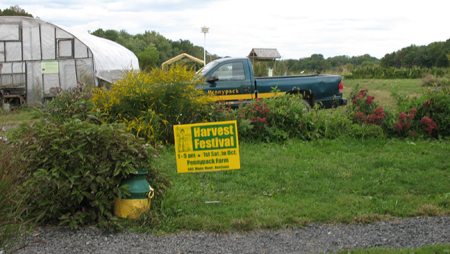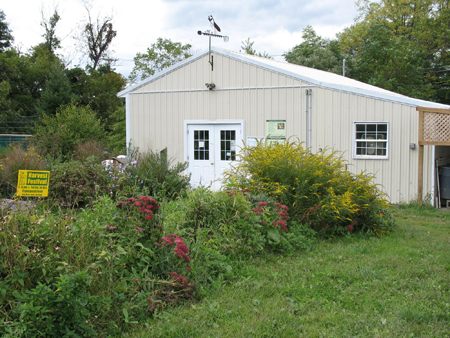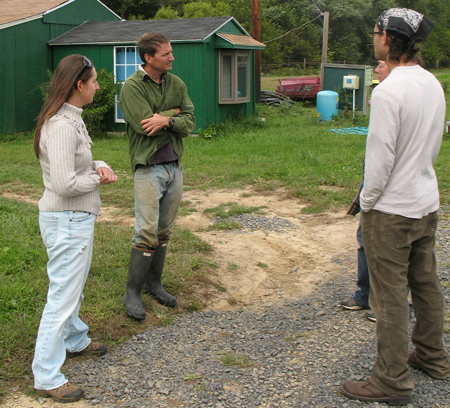Fred Beddall, Farm Manager of Pennypack Farm in Horsham, PA, led a series of questions for the 7 interns and 3 speakers who attended this workshop on Saturday, September 26th. Speakers included Margot Bradley, Pennypack's Program Coordinator, Amy Johnson representing Red Hill Farm and John Fowler from Anchor Run Farm in Wrightstown Township.

Fred moderated the session, asking a series of questions that ranged from how the farms originated, to infrastructure and operations and how funding processes were developed. He also followed up with details about shares, which crops are grown and finally asked how the farms had each found 'good fortune' and evolved profits. Some of my video is challenged from the gusty winds that day, but you can turn up the volume to hear the audio.

Fred moderated the session, asking a series of questions that ranged from how the farms originated, to infrastructure and operations and how funding processes were developed. He also followed up with details about shares, which crops are grown and finally asked how the farms had each found 'good fortune' and evolved profits. Some of my video is challenged from the gusty winds that day, but you can turn up the volume to hear the audio.
Red Hill Farm CSA: Amy Johnson is the former Director of Farming Operations from Red Hill Farm in Aston, PA. The farm's 6 acres is in its 8th year of production, on a 183 acre tract owned by the Sisters of St. Francis. The Sisters generously bought everything, including two high tunnels, and other equipment required to run the farming operation. Luckily they already owned mowers, backhoes and bobcats with an auto shop and heated greenhouse with potting shed on the premises.
Amy was paid full-time with benefits as manager at Red Hill and they offered 3 interns $100/week with 3 meals a day. One of the interns received housing but the other two were local. The second year the Sisters hired her husband as a co-farmer and the CSA doubled. However, since the rules forbade women and men living together, this became a hardship for housing issues. The small trailer on the land wasn't large enough to support two adult men, and women interns didn't always show up in pairs. The solution was hiring local help at $10/hr - no benefits.
The CSA supported 100 people the second year and they offer 10 workshares. In exchange for 100 hours a season, the farm offers a share. Members are required to work 4 hours weekly.
The CSA supported 100 people the second year and they offer 10 workshares. In exchange for 100 hours a season, the farm offers a share. Members are required to work 4 hours weekly.
Red Hill applied for a $40k grant to put solar panels on the barn, supplying energy to the well. They have a strong core group of 10 people who were there from the beginning, helping with fundraising, orientation and on pickup days. They work with their members to coordinate farm products, newsletters and office type jobs.
Red Hill has participated in potlucks and fundraisers to save for necessities like a walk-in cooler and composting toilet even though the Sisters cover most items. The farm supplies food for the 70 to 80 member convent and there is also a large retirement center on the property. Although children are welcome in a designated garden, the living situation for women and men is not ideal and families who want to work and live on the farm would find this a challenge.
Anchor Run CSA: John Fowler, a professional geologist and member of the Wrightstown Township EAC, was raised on a small farm and has been with Anchor Run Farm since they began. The space was purchased by the township through a planning grant with the support of 2500 residents and supervisors. The CSA was begun through a master plan developed through a grant given by the PA Dept of Conservation and Natural Resources (DCNR). The process to organic farming has been gradual, and John mentioned that most farmers in the area still rely on outdated methods; using Roundup and mono-cropping corn or soybeans. Anchor Run does have issues with drift from these treated fields that can compromise their organic beds.
The farmers on Anchor Run own all the mobile equipment like tractors and mowers, and the township, through a combination of financing assets, maintains the deer fences, greenhouse, existing barns and homestead. Anchor Run used grants from the state to drill a well and had an Energy Harvest grant for solar panels that power the well and cooler. Volunteer labor was used to help build the deer fencing, greenhouse and hoophouse. The township provides one house at a reduced rental rate for a farmer.
Two farmers live on site and pay rent to the township. They employ and pay out of their own pockets, the 3 interns at $10/hour - no benefits. The farmers make their income from 180 CSA shares, from 230 families. They have 75 families currently on their waiting list and offer a small discount off the $750/share fee to Wrightstown residents.
However, John admits that the last farm managers had two young children and were barely able to sustain themselves. With no affordable healthcare or retirement funding, they decided to move to Israel and work a Kibbutz where housing and healthcare costs are covered. Fortunately they knew how to operate and set up a farm before they arrived at Anchor Run, so that a system was in place after their departure, for subsequent farmers.
There is an active core group at Anchor Run, which helps to operate the CSA and website, scheduling and interaction with the farmers. They have benefited from highly supportive township supervisors, state grants and advertising on PASA, NOFA and other farm sites. The Bucks County Foodshed Alliance is a local entity that offers much support for the area. Check out Anchor Run's website for some great ideas. They offer a newsletter, recipes, events and links to other farmers markets in the area.

Pennypack Farm CSA: Pennypack is unique in that it's both a farm and a non-profit education center employing Andy Andrews as the full-time Farm Director, Fred as the full-time Farm Manager, both with full benefits, and Margot Bradley as the center's half-time Program Coordinator, along with 2 seasonal farm workers. Initially called farm interns, the second year workers are elevated to 'farmer' status. Mid-season intern Jessica Gerani was there to answer any questions about her own experience.

Margot Bradley was one of the original founders of the farm in 1999. Now coordinating projects, writing grants and developing new programs for the non-profit center, she talked about its origins. In March of 2003 the land was basically barren. By May they had a CSA up and running and hired a farm manager, offering full benefits. Two years ago the farm was able to support a second full-time farmer with benefits, and local interns were brought in to help during the season. There is no available housing and they have never had unpaid internships. The center has as its core value a 'living wage', even though in the past this has sometimes been beyond their reach. Over 30 workshare members bring in the harvest on about 8 acres and help with distribution. All members have workshare duty at 4 hours/share or can buy them out at $60.
From their website:
'Pennypack Farm grew from the commitment of a handful of citizens who responded to a letter in a local newspaper (Ambler Gazette, April 2000) suggesting the formation of a community farm for the purpose of accessing fresh, local, organic produce and preserving land within our watershed. Initial dialogues among these committed citizens grew into a vision and a plan for action. The organization gradually took shape over the next two years, finally culminating in early 2003 with the formation of an 11-member Board of Directors, the signing of a lease for land to grow crops, the hiring of a farm manager and assistant, and receiving official charter as a 501(c)(3) educational non-profit corporation.'


Starting with 90 shares, the CSA increased to 100 the second year, and the share model was changed to units in 2006. Pennypack offers units in two different sizes; a large share equals 10 units/week at $675, the smaller share is 6 units/week at $450. The unit is approximately a bunch or 1 lb, members are trained to weigh the produce and a limit for units is set on whatever is not abundant at the time. There are sign-in and out sheets for workshare members, a long-time volunteer board member usually overseeing these time management tasks.
This year they hired a professional bookkeeper and plan to increase the share prices in 2010. Margot says they also plan to expand to having 14 acres in production over the next few years.
In addition to the CSA, Pennypack offers a Local Foods Market in their pickup building, open to members 3 days a week from 2:30pm to 7:30pm. Margot proudly showed off the two new coolers she'd picked up from a liquidation company located in Princeton, NJ - and they even deliver!
In 2009 Pennypack's farming program will operationally break even, not including equipment purchases. $70k is raised yearly from individuals and grants to support capital improvements and educational programming. The goal is to have a 3 month operational pad.

The education center offers a low income summer camp and partners with the College Settlement of Philadelphia, their land-lease host who who has owned the 253 acres since 1973. The community landowners are a non-profit with their own board, offering the farm a one year revolving lease. Wonderful educational signs identifying farming techniques and methods are situated in front of crops and various garden beds; secured through a grant, they explain to both children and adults the benefits of sustainable farming, like no-till, beneficial insects and crop rotation.


Margot suggests that the Local Foods Market at the farm will begin generating more profits as it becomes more well known. Greeters work the register and network with the local community. There is an outreach volunteer and they are expanding events and potlucks, adding activities like cooking demonstrations, and family campfire evenings. Giving the public an opportunity to participate and help is an effective way to build membership and visibility in the community.
The final agreement was that while all three farms are sustainable, none are yet making much of a profit.


With more public support-through pledges to buy from local producers- and with a variety of funding and creative efforts, farming has a very good chance of becoming profitable in urban communities. The state of Illinois just passed a bill making a commitment to restructure the food system to promote local consumption. Vermont launched a Keep Local Farms program this month and the Mayor of San Francisco pledged this July to create a Sustainable Food Mandate for the city, reputed to be one of the most ambitious food policies in the country. There is renewed hope for local farming!
We appreciated the different aspects and challenges of each farm startup and heartfelt thanks to Fred, Margot, Amy and John for sharing their individual goals and 'good fortunes' with us.
Stay tuned for the last SAITA presentation of the season on October 3rd, 11am to 1pm at Shellbark Hollow Farm. Topic will be a Cheesmaking workshop and farm tour, with special appearances by Maggie and others.
Happy fall and best wishes for a productive and healthy winter!
Victoria Webb
SAITA Coordinator
vic@furiousdreams.com
ps Happy Cat Organics will be offering a tomato seed saving workshop on October 9th at the Fermentation Festival in Kennett Square. Tim's workshop with us has been cancelled for this season.
No comments:
Post a Comment